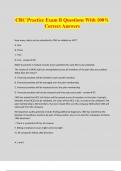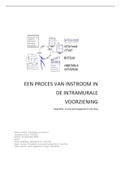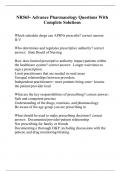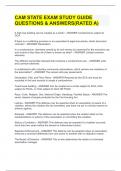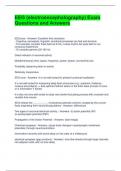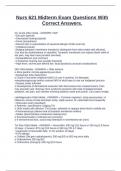Chapter 1: Some very important starting information
What is qualitative research?
- Words as data
- Refers to data collection and analysis, and to a wider framework
- Paradigm: beliefs, assumptions, values, and practices shared by a research
community
- Big Q: application of the qualitative methods of data collection and analysis within a
qualitative paradigm
- Small Q: use of specific qualitative data collection and techniques
- Not necessary within a qualitative paradigm
Quantitative Qualitative
Numbers as data Words as data
Identify relationships between Interpret meanings, recognises that
variables to explain or predict data in context
Generalise findings to a wider Only sometimes findings contribute
population to a general understanding
Shallow but broad data → not a lot Narrow but rich data → detailed
of complex detail obtained from accounts of each participant, not
each participant, lots of participants many take part
take part
Seeks to find patterns, norms, Explores differences within data →
consensus → reduces diversity of tends to seek patterns, but
responses to an average response accommodates divergence within
data
Theory testing Theory generating
Detachment and impartiality Involvement and subjectivity
Fixed method → method doesn’t Method is less fixed → method can
change once data collection has change throughout data collection
begun
Can be completed quickly Takes long to complete
Qualitative research paradigm
- Not only one correct version of reality or knowledge
- Versions of reality closely linked to context they occur in
, - Qualitative research = always consider context
Qualitative paradigm
- Use of qualitative data, analysis of words
- Use of naturally occurring data methods that resemble real life (compared to
experiments) → make use of context
- Interests in meaning
- Use of inductive, theory-generating research
- Reject natural (quantitative) science research model, including the idea of an
objective researcher
- Researchers will bring their subjectivity, but this is seen as a strength
Skills in qualitative research
Qualitative sensibility = orientation towards research in terms of research questions and
analysing data
- Interest in process and meaning over cause and effect
- Critical approach to knowledge, ask why and how
- Ability to reflect on own subjectivity
- Development of analytics ear, critically reflect on data while listening
- Reflexivity: critical reflection on research process and one’s own role
- Interactional skills
, Chapter 2: Ten fundamentals of qualitative data
1. Qualitative research is about meaning, not numbers
- Qualitative research deals with meanings
- Is about capturing some aspect of the social or psychological world
- Puts organising framework around some messy aspect
- Is not about testing hypotheses, nor comparing groups
- Knowledge comes from context → qualitative research does not assume the same
results can be reproduced under different circumstances like in quantitative research
2. Qualitative research doesn’t provide a single answer
- There’s more than one way to assign meaning to data
- There’s not a single ‘right’ answer
- Analysis of data tells one story, a different analysis might tell a different story
- Stories = subjective interpretation of data
- There are many stories
- There is no absolute truth
3. Qualitative research treats context as important
- Information and knowledge always come from somewhere
- Data is produced in particular contexts
- Qualitative research recognises bias and incorporates them into the analysis
4. Qualitative research can be experiential or critical
- Exploratory, open-ended, organic
- Produced rich, in-depth, and detailed data
- Divided into two broad camps → experiential and critical
- Experiential = meanings, views, perspectives, experiences
- Interpretations are prioritised and focused on
- Critical = uses meaning in data to explore something else
- Seeks to understand factors influencing meanings
5. Qualitative research is underpinned by ontological assumptions
Ontology: branch of philosophy that is concerned with existence and reality
- It deals with the nature of reality or truth
- ‘What is existence?’, ‘What is there?’, ‘What is the nature of existence?’
- Relativism: there are multiple realities
- Reality is dependent on the ways we come to know it
- Truth is relative to context
- Critical realism: a pre-social reality exists which can only be partly accessed
- Qualitative research adopts critical realism
- Realism: assumes a pre-social reality exists that is accessible through research
- There is one objective truth
What is qualitative research?
- Words as data
- Refers to data collection and analysis, and to a wider framework
- Paradigm: beliefs, assumptions, values, and practices shared by a research
community
- Big Q: application of the qualitative methods of data collection and analysis within a
qualitative paradigm
- Small Q: use of specific qualitative data collection and techniques
- Not necessary within a qualitative paradigm
Quantitative Qualitative
Numbers as data Words as data
Identify relationships between Interpret meanings, recognises that
variables to explain or predict data in context
Generalise findings to a wider Only sometimes findings contribute
population to a general understanding
Shallow but broad data → not a lot Narrow but rich data → detailed
of complex detail obtained from accounts of each participant, not
each participant, lots of participants many take part
take part
Seeks to find patterns, norms, Explores differences within data →
consensus → reduces diversity of tends to seek patterns, but
responses to an average response accommodates divergence within
data
Theory testing Theory generating
Detachment and impartiality Involvement and subjectivity
Fixed method → method doesn’t Method is less fixed → method can
change once data collection has change throughout data collection
begun
Can be completed quickly Takes long to complete
Qualitative research paradigm
- Not only one correct version of reality or knowledge
- Versions of reality closely linked to context they occur in
, - Qualitative research = always consider context
Qualitative paradigm
- Use of qualitative data, analysis of words
- Use of naturally occurring data methods that resemble real life (compared to
experiments) → make use of context
- Interests in meaning
- Use of inductive, theory-generating research
- Reject natural (quantitative) science research model, including the idea of an
objective researcher
- Researchers will bring their subjectivity, but this is seen as a strength
Skills in qualitative research
Qualitative sensibility = orientation towards research in terms of research questions and
analysing data
- Interest in process and meaning over cause and effect
- Critical approach to knowledge, ask why and how
- Ability to reflect on own subjectivity
- Development of analytics ear, critically reflect on data while listening
- Reflexivity: critical reflection on research process and one’s own role
- Interactional skills
, Chapter 2: Ten fundamentals of qualitative data
1. Qualitative research is about meaning, not numbers
- Qualitative research deals with meanings
- Is about capturing some aspect of the social or psychological world
- Puts organising framework around some messy aspect
- Is not about testing hypotheses, nor comparing groups
- Knowledge comes from context → qualitative research does not assume the same
results can be reproduced under different circumstances like in quantitative research
2. Qualitative research doesn’t provide a single answer
- There’s more than one way to assign meaning to data
- There’s not a single ‘right’ answer
- Analysis of data tells one story, a different analysis might tell a different story
- Stories = subjective interpretation of data
- There are many stories
- There is no absolute truth
3. Qualitative research treats context as important
- Information and knowledge always come from somewhere
- Data is produced in particular contexts
- Qualitative research recognises bias and incorporates them into the analysis
4. Qualitative research can be experiential or critical
- Exploratory, open-ended, organic
- Produced rich, in-depth, and detailed data
- Divided into two broad camps → experiential and critical
- Experiential = meanings, views, perspectives, experiences
- Interpretations are prioritised and focused on
- Critical = uses meaning in data to explore something else
- Seeks to understand factors influencing meanings
5. Qualitative research is underpinned by ontological assumptions
Ontology: branch of philosophy that is concerned with existence and reality
- It deals with the nature of reality or truth
- ‘What is existence?’, ‘What is there?’, ‘What is the nature of existence?’
- Relativism: there are multiple realities
- Reality is dependent on the ways we come to know it
- Truth is relative to context
- Critical realism: a pre-social reality exists which can only be partly accessed
- Qualitative research adopts critical realism
- Realism: assumes a pre-social reality exists that is accessible through research
- There is one objective truth



